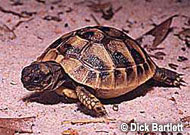Description:
Hermann's tortoises are generally regarded as the hardiest of the genus when kept in typical indoor captive conditions. Indoor tortoises require strong enclosures–the sides should be taller than the combined heights of the occupants, the floor area should be 10 times the size of the occupants. It is best to make an indoor tortoise enclosure long and relatively narrow. A temperature gradient should be provided by heating one end of the enclosure (between 85 and 95 degrees Fahrenheit) using a full-spectrum incandescent basking light. A hot rock or heat tape may also be used so long as a cool area is always provided. Tortoises are almost half bone and shell, so they have a great need for calcium. In order to absorb all the calcium they require, calcium levels in their diet must exceed phosphorus levels. Foods that are high in calcium, but low in phosphorus, include dandelion greens, collard greens, parsley, kelp, watercress, celery and orange rind. An almost exclusive vegetarian diet is best; pesticide-free grass can provide roughage.
Habitat:
Generally grasslands and meadows.
Range:
Southern Europe, particularly in Italy and Greece, the islands of Corsica, Sardinia, Sicily and other Mediterranean and Ionian islands east through southern Bulgaria and western Turkey.
Scientific Name: Testudo hermanni
Species Group: tortoise
Family: Testudinidae
Size: Up to 11 inches in length.
Level: beginner
Weight: N/A
Dangerous: No


